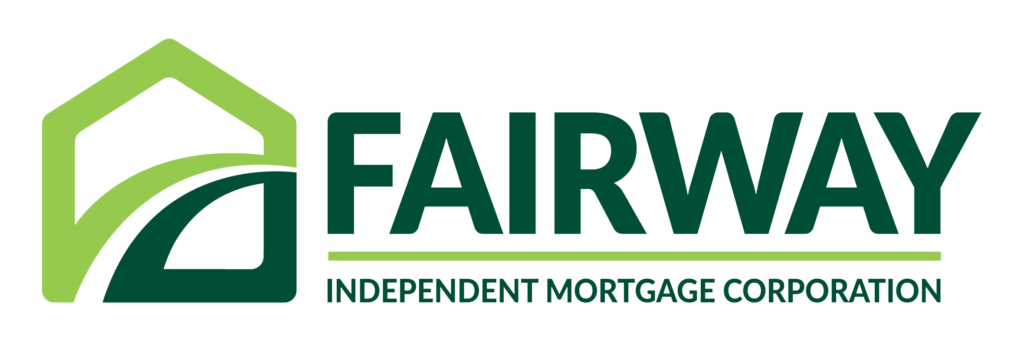What Could a Reverse Mortgage Loan Mean for Your Children?

With record-high home equity gains in recent years, reverse mortgage loans have become an increasingly popular financial option for older American homeowners. However, despite the benefits, many are concerned about the implications of reverse mortgage loans for their children, such as “How will it impact the home and legacy I want to leave behind?” and “Will I become a financial burden for my kids?”
In this article, we’ll explore how tapping your home wealth via a reverse mortgage can help you enjoy a more comfortable, secure retirement while providing the peace of mind that your children and heirs can continue their financial independence and benefit from the legacy you leave behind.
What This Article Covers:
- How a Reverse Mortgage Loan Works
- Debunking Common Reverse Mortgage Loan Misconceptions
- How a Reverse Mortgage Loan Can Benefit You and Your Heirs
How a Reverse Mortgage Loan Works
A reverse mortgage is a home-secured loan that allows homeowners 62 and older to convert a percentage of their home equity into cash, fixed monthly advances or a line of credit.
Reverse mortgage loans don’t require monthly payments. Instead, the homeowner simply has to cover property charges such as taxes, insurance and home upkeep. Instead of monthly payments, the home sale settles the loan. As long as the borrower complies with the loan terms, the balance comes due only when all borrowers move out of the home or the last surviving borrower passes away.
The Home Equity Conversion Mortgage (HECM) is the most popular type of reverse mortgage loan and the only one insured by the Federal Housing Administration (FHA). Throughout this article, we’re referring to HECMs when discussing reverse mortgage loans.
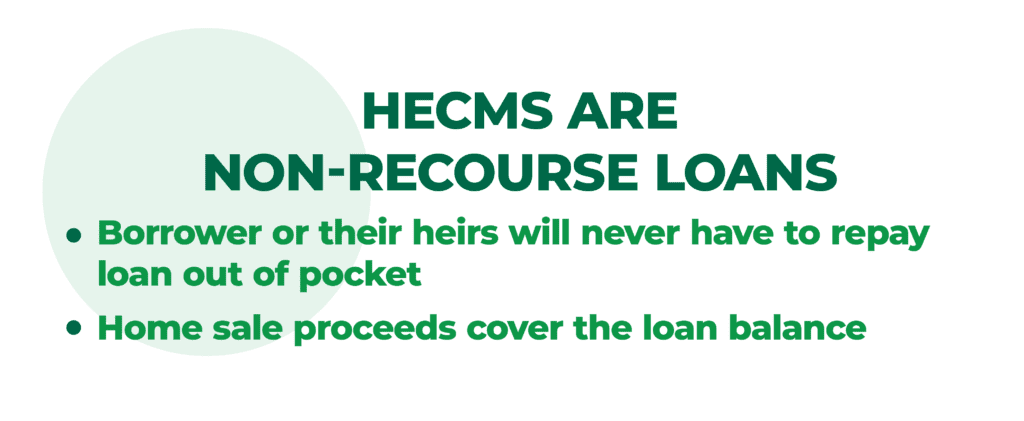
HECMs are non-recourse loans, meaning that as long as the borrowers fulfill the terms of the loan, they (or their heirs) will never have to repay the loan out of pocket as the home sale proceeds cover the loan balance.
Suppose a borrower took out a reverse mortgage loan when their home was at peak value but sold the home years later in a depressed housing market. The mortgage insurance fund, administered by FHA, would cover the shortage, not the borrower or their heirs.
Debunking Common Reverse Mortgage Loan Misconceptions
Reverse mortgage loans have garnered a negative reputation, thanks in no small part to the various misconceptions surrounding the product, particularly the impact on borrowers’ children and heirs. Let’s discuss and dispel some common misconceptions.
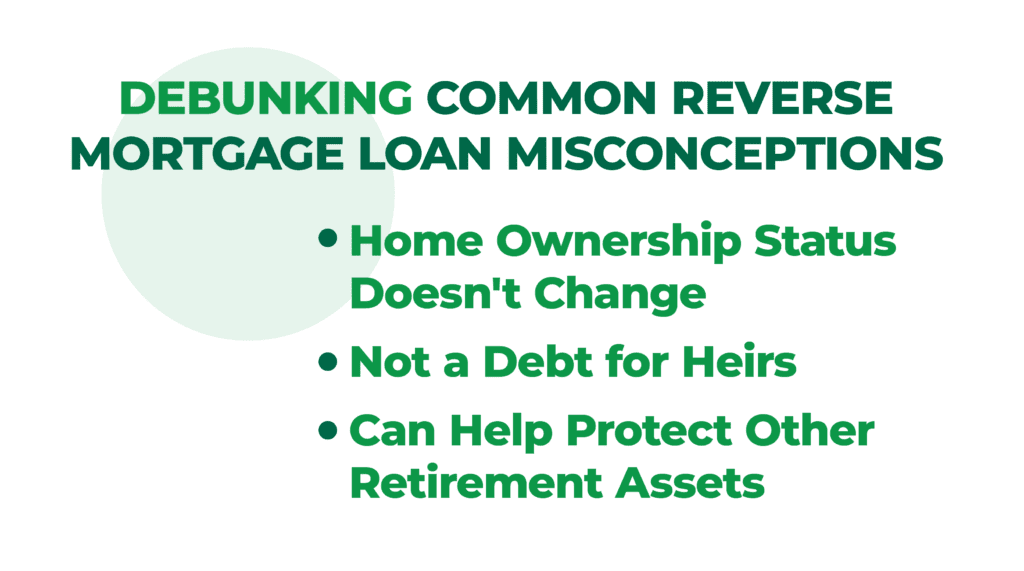
Homeownership Status Doesn’t Change
A reverse mortgage loan changes nothing about who owns the home. The deed to the home remains in the borrower’s name exactly as before. As long as the borrower lives in the home as their primary residence and keeps up with the taxes, insurance and home maintenance, no one can make them leave or sell the home. It’s your legacy, and you decide what to do with it.
Not a Debt for Heirs
The most prevalent misconception about reverse mortgage loans is that they saddle heirs with significant debt after the borrower passes away. As mentioned earlier, HECMs are non-recourse loans. When the loan becomes due and payable, if the home sale is less than the loan amount, the mortgage insurance paid by the borrower – the Mortgage Insurance Premium (MIP) – covers the difference, not the borrower or their heirs.
Should a borrower pass away and the heirs choose to keep the home, they have the first right of refusal and can purchase the property for 95% of the appraised value. Or, if they so choose, the heirs can sell the home and keep any remaining equity after settling the loan balance.
Regardless, you don’t have to worry about leaving your children or heirs a significant debt.
Can Help Protect Other Retirement Assets
Another common misconception is that reverse mortgage loans somehow eliminate a home’s equity, reducing the total financial legacy borrowers leave for their heirs. In reality, it’s simply an advance on a home’s equity. Instead of relying on assets like savings, stocks and bonds, the borrower can use their loan proceeds to protect those assets.*
This concept is known as a “buffer strategy.” In a turbulent economy, stocks and other retirement assets may become devalued for a period of time.
Suppose those are the primary funds an older-adult homeowner needs for their expenses. In that case, they may become too depleted to recover, fractioning the funds they leave their heirs and possibly requiring financial assistance from their children. Using a HECM, the homeowner could use their loan proceeds to cover expenses until the markets stabilize and avoid compromising their legacy or their children’s financial stability.*
How a Reverse Mortgage Loan Can Benefit You and Your Heirs

Cash Flow Flexibility
One of the most challenging aspects of retiring on a fixed income, and one of the most common worries for children of retirees, is having the financial flexibility to enjoy life and cover unexpected expenses. Unforeseen healthcare costs, particularly long-term care (LTC), can create a level of financial strain that sometimes requires the monetary support of their adult children.
Reverse mortgage loans offer a range of payout choices for borrowers to align their cash flow strategy with their retirement goals and changing circumstances. Two payout options beneficial for cash-flow flexibility are modified term payment plans and flexible lines of credit.*
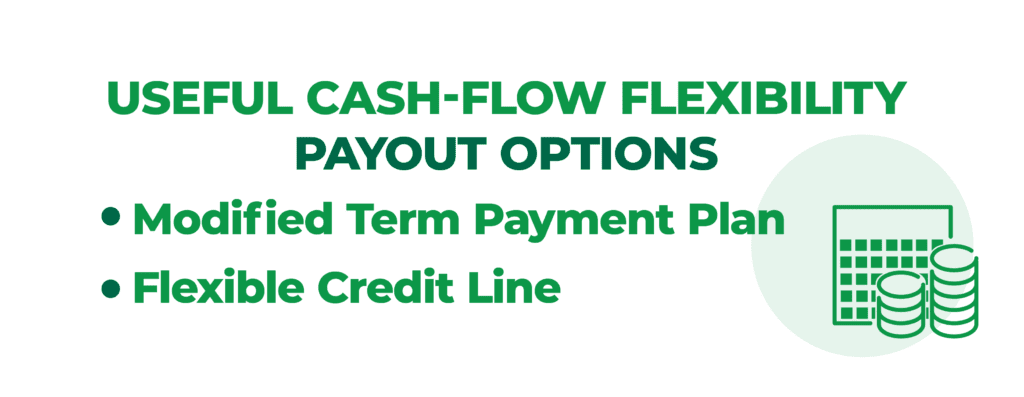
Modified Term Payment Plan
Modified term payment plans provide monthly payments for a fixed period (6 months, 12 months, 18 months, etc.), creating a reliable and regular source of cash. The term payments can be flexible depending on how much the borrower wants to access monthly and, once the term period concludes, changes to a flexible line of credit.
Flexible Credit Line
Homeowners can choose a flexible credit line following the initial modified term payment plan. The credit line acts as a safety net, allowing retirees to access home equity as needed.
What sets the HECM credit line apart from traditional loans is that the unused portion can grow over time, providing additional financial flexibility that many adult children would love for their parents, especially those on a fixed income.
Can Help Create a Legacy Now
Although passing on a home to their children is an incredible gift, often, it’s one parents give after passing away. They don’t get to enjoy, share or improve the legacy of an inherited home.
Reverse mortgage loan proceeds offer the financial flexibility to fund various benefits for children, from financing life insurance plans with generous payouts to annuities for their grandchildren’s college education and many other life-changing gifts.* Borrowers can experience and witness firsthand the joy their hard work and years of homeownership bring to their loved ones.
Can Live Closer To Loved Ones
It’s common for adult children to live in more expensive areas than their retired parents. Though parents want to live closer to family, especially to help and spend time with grandchildren, relocating to a pricier locale on a fixed income is often impossible without serious lifestyle sacrifices.
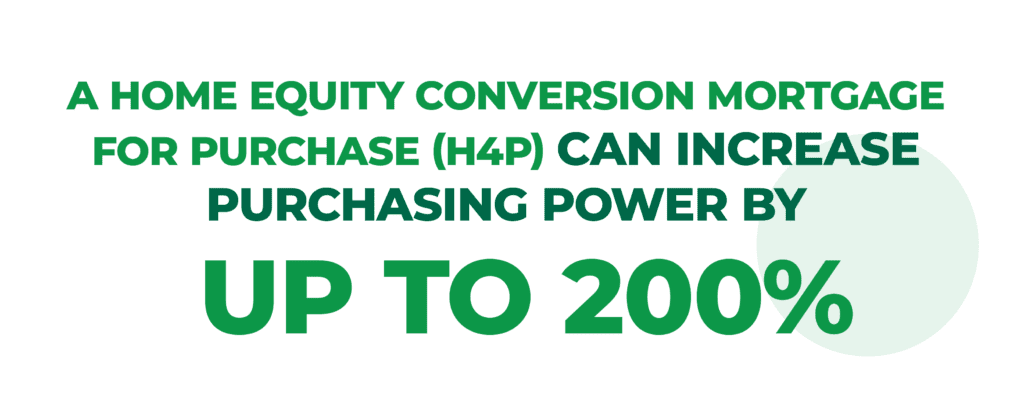
Fortunately, borrowers can use a reverse mortgage loan to purchase a new property. A Home Equity Conversion Mortgage for Purchase (H4P) loan can increase purchasing power by up to 200%, allowing borrowers to buy more expensive homes closer to their adult children.
What Can a Reverse Mortgage Loan Mean for You and Your Loved Ones?
We’ve only scratched the surface of how a reverse mortgage loan can work for you, your children and your legacy. If you want to learn more about how a reverse mortgage impacts you and your loved ones or have more questions about the product, contact one of our experienced reverse mortgage planners today.
Let’s Start a Conversation!
If you’re interested in learning more about HECM loans and if one might be right for you or a loved one, Fairway Independent Mortgage Corporation can help. Connect with us today.
Copyright©2023 Fairway Independent Mortgage Corporation (“Fairway”) NMLS#2289. 4750 S. Biltmore Lane, Madison, WI 53718, 1-866-912-4800. All rights reserved. Fairway is not affiliated with any government agencies. These materials are not from HUD or FHA and were not approved by HUD or a government agency. Reverse mortgage borrowers are required to obtain an eligibility certificate by receiving counseling sessions with a HUD-approved agency. The youngest borrower must be at least 62 years old. Monthly reverse mortgage advances may affect eligibility for some other programs. This is not an offer to enter into an agreement. Not all customers will qualify. Information, rates and programs are subject to change without notice. All products are subject to credit and property approval. Other restrictions and limitations may apply. Equal Housing Opportunity.
*This article does not constitute financial advice. Please consult a financial advisor regarding your specific situation.
